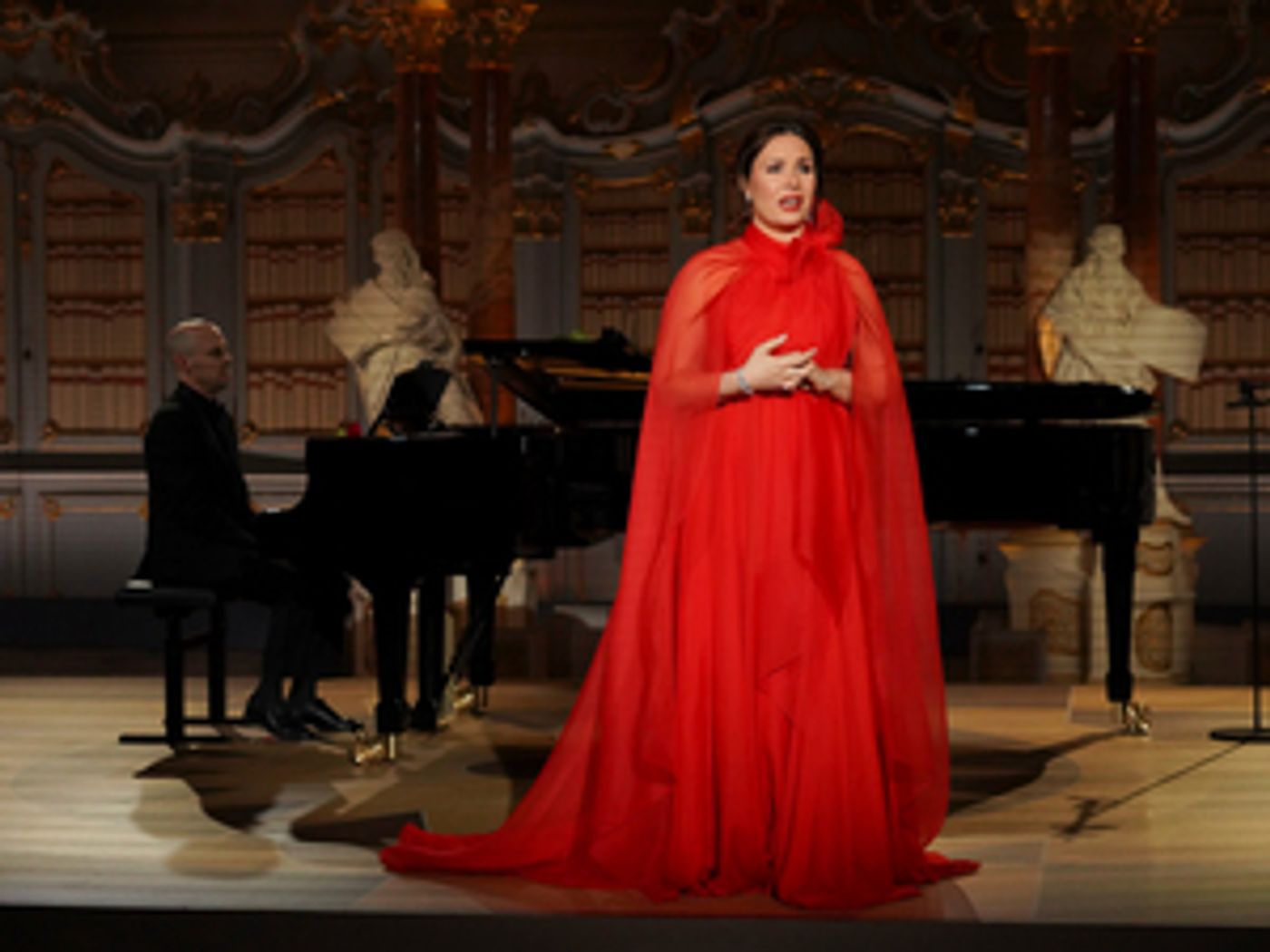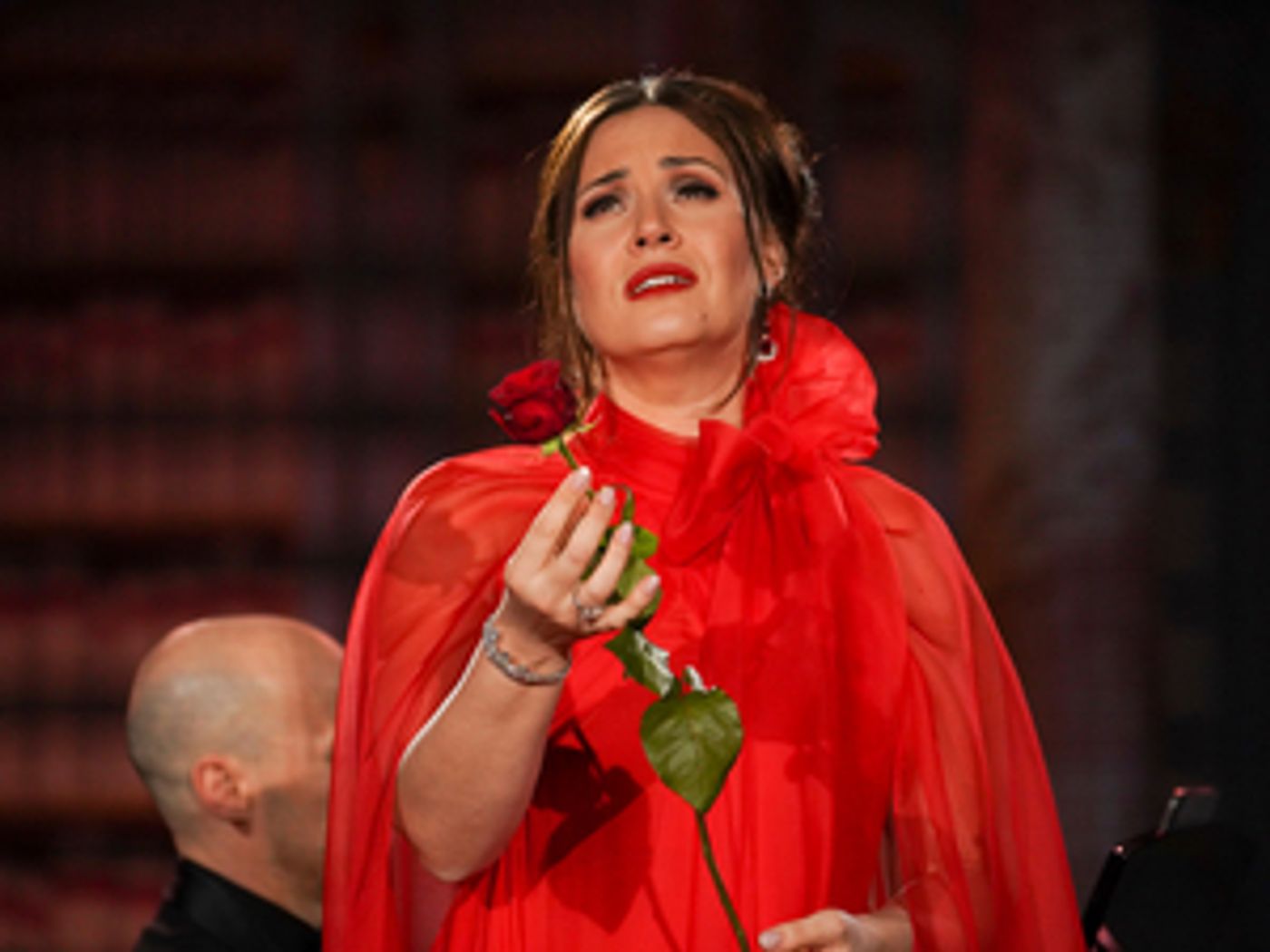Review: Ups and Downs Mark Yoncheva's Daredevil Concert in Germany for Met Series
From the Baroque to the French Music Hall, the Soprano Covered Them All

taken from her Met Stars Live in Concert performance.
You have to be something of a daredevil to take on the kind of program--switching from style to style, from Purcell to Verdi and Puccini to Edith Piaf--that Sonya Yoncheva chose for her entry in the Met Stars Live in Concert series. I was looking forward to it, having been won over by three of her performances at the Met: a wonderful TRAVIATA, a terrific LUISA MILLER and a Desdemona in OTELLO that prompted me to call for a renaming of the opera for her character.
If you need any convincing that a "simple" recital, with lots of breaks, isn't easier for the performer than being in a full-fledged opera, you have only to look as far as the Bulgarian soprano's concert--shown live from Germany on February 27 but still available on-demand from the Met's website until March 12, with Christine Goerke as host--to know that view is a fallacy. (And, of course, it's a challenge for the accompanist as well, here, the well-schooled pianist Julien Quentin, who offered staunch support.)

her recital in Germany as part of the Met's series
She started off with the showpiece, "Ritorno vincitor" from AIDA, a difficult road even when the singer has time to warm up. But to do it 'cold' takes a lot of brass, and Yoncheva had mixed results with it, though never seemed tentative.
She had the fiery dynamics down pat and sang smoothly enough, but there was a lack of color in her voice that was disappointing. She went on to another Verdi, "Tacea la note placida" from TROVATORE, with similar results.
She began to blossom somewhat when she took on Mimi's "Donde lieta usci" from BOHEME, as her "break-up" aria to Rodolfo declared it could happen "senza rancor (without animosity)."
Then came Dvorak's "Song to the Moon" from RUSALKA, with its Slavic roots close to the soprano's. Here, her voice shone thoughtfully, showing she could caress a phrase and win us over.
And now a word from our sponsor...or a chance for the singer to take a break, at least. There was a short interview, where Yoncheva talked about her fatalistic approach to the music preceding her death scene in OTELLO, (spoiler alert! Ha!), which we would see in a clip from the HD broadcast of her Met performance. She sounded lovely and slightly fearful in the "Ave Maria. Though I understand her choice of material, I still wish she'd included the Willow Song ("Salce, salce") as well.
The second part of the concert started with an aria that host Goerke described as coming from Puccini's "flop": the lush "Se come voi piccina io fossi" from LE VILLI, which, in the hands of Yoncheva, sounded like the 1884 opera was a kissing cousin of BOHEME, which didn't premiere for another dozen years. (By the way, this was Puccini's first opera and, written for a competition for one-act operas, didn't even win honorable mention, though the aria remains a favorite of sopranos.)
The soprano included just one aria in English on her program, though it's not exactly a contemporary work: "Thy hand, Belinda...When I'm laid in rest," otherwise known as "Dido's Lament," from Purcell's DIDO AND AENEAS, written somewhere in the 1680s. Musically, she sang lushly; libretto-wise, it was pretty unintelligible. (There were subtitles, of course.) Luckily, she chose one of Handel's operas in Italian, where her language skills are on steadier ground: The breathtaking "Lascia ch'io pianga" from Handel's RINALDO.
She was in more comfortable territory here, vocally as well, and gave us a lovely rendition of the aria, with its demanding ornamentation. It not only showed her considerable dramatic and musical skills, but helped show why this was the composer's most popular opera during his lifetime.
She ended this section of the program with one of Puccini's "Un bel di" from MADAMA BUTTERFLY, which is on her upcoming schedule when the Met opens its doors, and gave us something to look forward to.
The intermission this time featured, also from a Live in HD broadcast, Tosca's murder of Baron Scarpia, after he's given her and Cavaradossi safe passage out of Rome (or so she thinks). I'd been at the opening of this latest production at the Met and found the soprano slightly underwhelming; here, her shoes fit more comfortably and she seemed more sure of herself. (Singers have told me that the opening of a production is really like the dress rehearsal, because of the limited stage-time for them prior to the premiere.)
The last part of the program included a change of language: French was the main attraction. Though there were familiar arias from CARMEN (Habanera) and MANON ("Adieu notre petite table") and THAIS ("Dis-moi que je suis belle"), that she sang with mixed success, the most affecting piece was a song written for the chanteuse, Edith Piaf, by herself and Marguerite Monnot. "Hymne a l'amour," the "Hymn to Love," seemed to really touch Yoncheva, with its note of hope, ending with "God reunites those who love each other." It was a good choice to end the program in this time when so many are dealing with isolation.
Yoncheva's concert from the Baroque Schussenried monastery in Germany, with its amazing tromp l'oeil decoration, is available on demand until March 12. For more information, see the Met's website.
Reader Reviews
Videos

